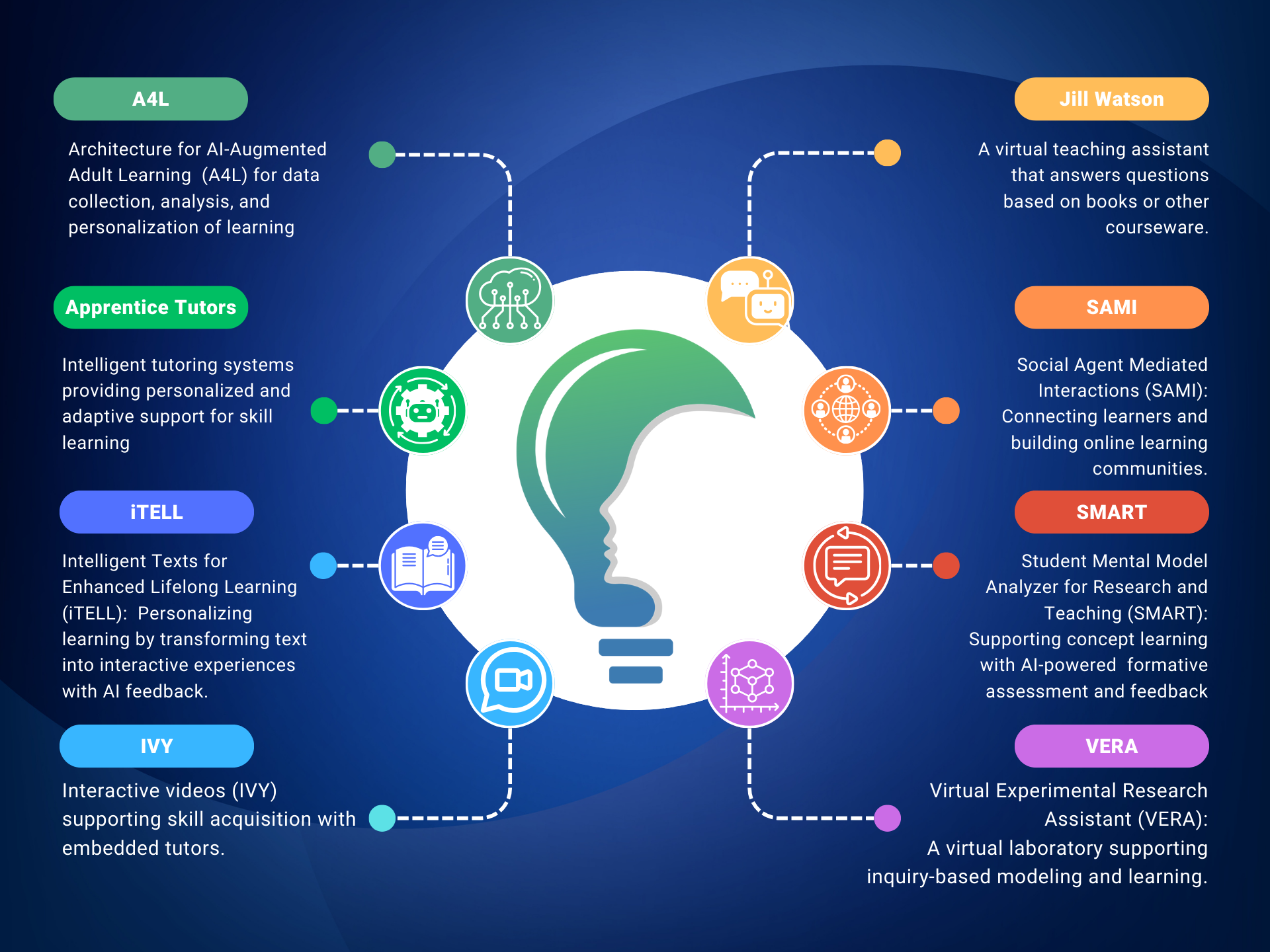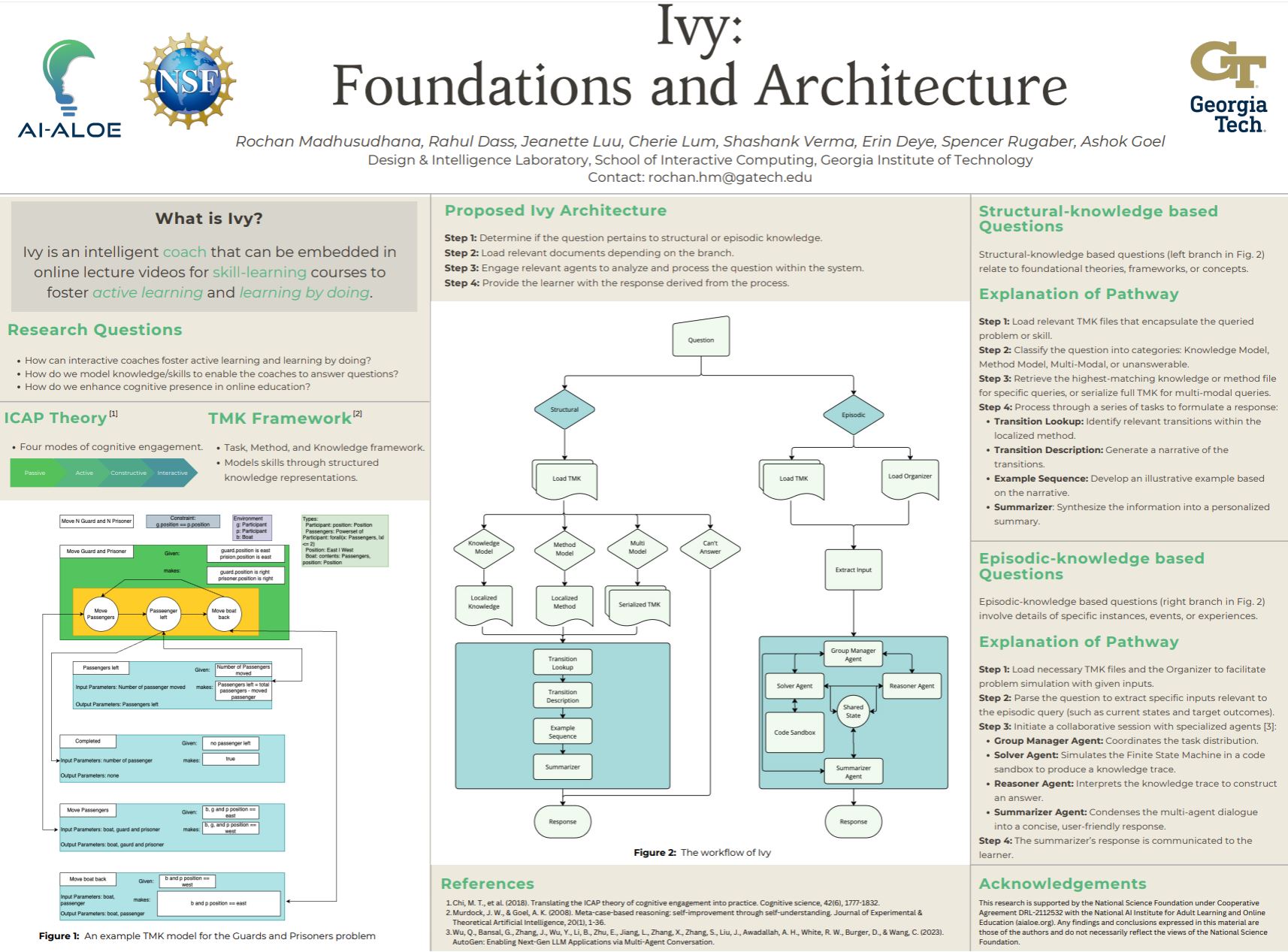The AI-ALOE researchers and scientists have developed and deployed a suite of AI technologies in classes to help create engaging and personalized learning experiences, driving educational innovation at scale.

You can learn more about these technologies from the summary below on how they help address teaching and learning challenges. You can also watch a short video demonstrating how each technology works.
We continue improving these technologies and developing new capabilities based on the feedback from teachers and students who are using them in teaching and learning. We are also looking for opportunities to expand their applications in more classes in various disciplines. Please contact us if you are interested in partnering with us to integrate these technologies into your curriculum.
Apprentice Tutors
An Intelligent Tutoring System Providing Personalized and Adaptive Support for
Math Problem Solving and Skill Learning
Research has proven that students benefit from 1:1 in-person tutoring, but it is challenging to provide this support to all students when they need it, especially in institutions with fewer resources. Apprentice Tutors aim to solve this problem by providing all students with personalized and adaptive support in learning Algebra whenever and wherever they need it.
The intelligent tutoring system supports students in solving multi-step problems by offering on-demand hints and feedback. It also estimates each student’s mastery of the underlying skills needed for problem-solving. The system then uses the mastery estimates to personalize interactions with the student, for example, by recommending which problem they should work on to optimize their learning.
The Apprentice tutors benefits teachers by regularly returning students’ mastery estimates as grades, enabling them to monitor and evaluate students’ learning progress and take action as needed to help students learn better.
iTELL
An Intelligent Framework That Personalizes Learning by
Transforming Traditional Text into Interactive Experiences with AI Feedback
Intelligent Texts for Enhanced Lifelong Learning (iTELL) is a computational framework that converts any type of machine-readable text into interactive, intelligent text within a web-app. iTELL is based on theories of reading comprehension and provides opportunities for users to write summaries about text and videos to demonstrate their understanding productively. The summaries are scored automatically by large language models (LLMs) specifically trained to generate scores which inform qualitative feedback to students related to content and wording. iTELL also uses AI to generate short questions for sections of the text and videos to assess comprehension through constructed responses. As well, iTELL includes a structured think aloud assistant based on generative AI that can help users make inferences and relevant elaborations for the text as well as link the text to their personal experience. The feedback from these AI integrations can be used in a number of different ways, including to guide learning, correct misconceptions, review missed topics, prepare for upcoming materials, make links between the texts and the real world, and help elaborate on what users have learned.
Ivy
Intelligent AI Coach by Georgia Tech’s Design Intelligence Lab Enhances Online Learning for Adult Re-Skilling/Up-Skilling
The Interactive Videos, or Ivy, is an intelligent AI coach developed by the Design Intelligence Lab, Georgia Tech, that can be embedded in online videos fostering active learning and learning by doing for adult learners looking to re-skill/up-skill. Based on the foundations of the “In-Video Tutor” [1], Ivy aims to combine Cognitive AI representations of problem-solving skills with a context relevant question-answering and explanation generation capabilities of Generative AI methods.
Currently, in terms of modeling problem-solving skills, Ivy uses the TMK (Task-Method-Knowledge) language [2-4] where the “Task” pertains to the goal of a skill, the “Method” specifies the mechanism of completing the goal, and the “Knowledge” refers to objects, concepts and operations in the environment. In combination with Generative AI methods like LangChain and Chain-of-Thought, Ivy aims to provide explanations with reasoning for students’ questions about video lecture content and students’ responses for exercises as part of an online course.
- Skill Learning: Understanding and Explaining Skills (Ivy) PowerPoint
- Ivy: Foundations and Architecture:

- Madhusudhana R., Dass, R., Luu, J., Lum, C., Verma, S., Deye, S., Rugaber, S., & Goel A. (2024) Ivy: Foundations and Architecture. AI-ALOE Showcase & AI for Learning Symposium. Georgia Tech.
Jill Watson
A Virtual Teaching Assistant That Empowers Teachers to Support and Engage All Students
A common problem in online education is a lack of teacher presence: online students do not necessarily have the kind of access to teachers (and teaching assistants) that face-to-face learners often do. Teachers, especially those who teach large classes, often have to allocate a significant amount of their time every day to answer questions, sometimes similar ones from different students. How can we enhance teacher presence in online classes while reducing the load on teachers?
Jill Watson is a virtual teaching assistant developed to assist teachers in answering students’ questions anytime, anywhere. It can be easily added to a course site in a learning management system as an LTI (Learning Tools Interoperability) and integrated with the course discussion forum. It automatically responds to questions concerning course syllabus, policies, and schedule. The responses are posted in the forum, efficiently addressing all students who might have the same questions.
SAMI (Social Agent Mediated Interactions)
An AI Agent Connecting Learners and Building Community in Online Learning
Learning is not only a cognitive process but also a social and emotional process. However, many online students often feel socially (and thereby also emotionally) isolated because of the distributed asynchronous nature of most online classes. How could we connect and engage learners who are geographically dispersed and build an online learning community?
SAMI is a virtual agent that uses AI and natural language processing to enhance social connectedness in online classes. Based on students’ introductory messages, it builds a knowledge base of the students, including their location, hobby, courses they have taken, etc. It then uses this knowledge to match students and connect them based on their shared identities and interests, helping them “break the ice” and build a “buddy” network to support and enhance social engagement in an online learning environment.
SMART (Student Mental Model Analyzer for Research and Teaching)
An AI-Powered System for Formative Assessment and Feedback
Reading is an integral part of concept learning, and writing summaries based on reading is often used to assess what students have learned from their reading. However, students, especially novice students, have difficulty putting together a good summary, and teachers find it time-consuming to grade and provide feedback on students’ writing. How could we turn this learning activity into a meaningful learning experience for students while not overwhelming teachers?
SMART is web-based system designed to provide formative assessment feedback to support students’ concept learning. It reviews students’ summaries and compares students’ knowledge models with an expert model. Based on this comparison, the system provides students with personalized feedback using concept maps, prompts, and feedback messages to help them develop a solid understanding of the reading.
VERA (Virtual Experimentation Research Assistant)
A Virtual Laboratory Supporting Inquiry-Based Learning in Ecology
Learning sciences often requires conducting experiments in a physical laboratory to practice lab skills. For online students or commuter students who have responsibilities that complicate scheduling in the on-campus lab, how could we enable them to participate in lab-based learning activities without the overhead and constraints of a physical lab?
VERA is a virtual laboratory for ecology developed in collaboration with the Smithsonian Institution’s Encyclopedia of Life Project to support inquiry-based learning. Students can use VERA to generate hypotheses for explaining given data, construct conceptual models, simulate the models to evaluate them, and validate the simulation results against data. VERA is available as a web application and thus is easily deployable.

